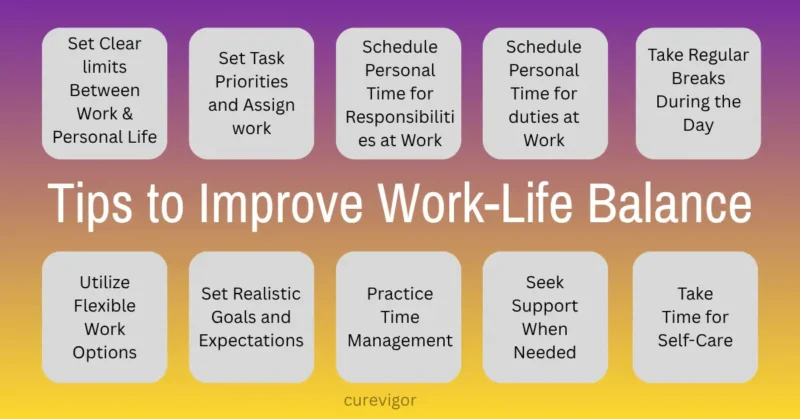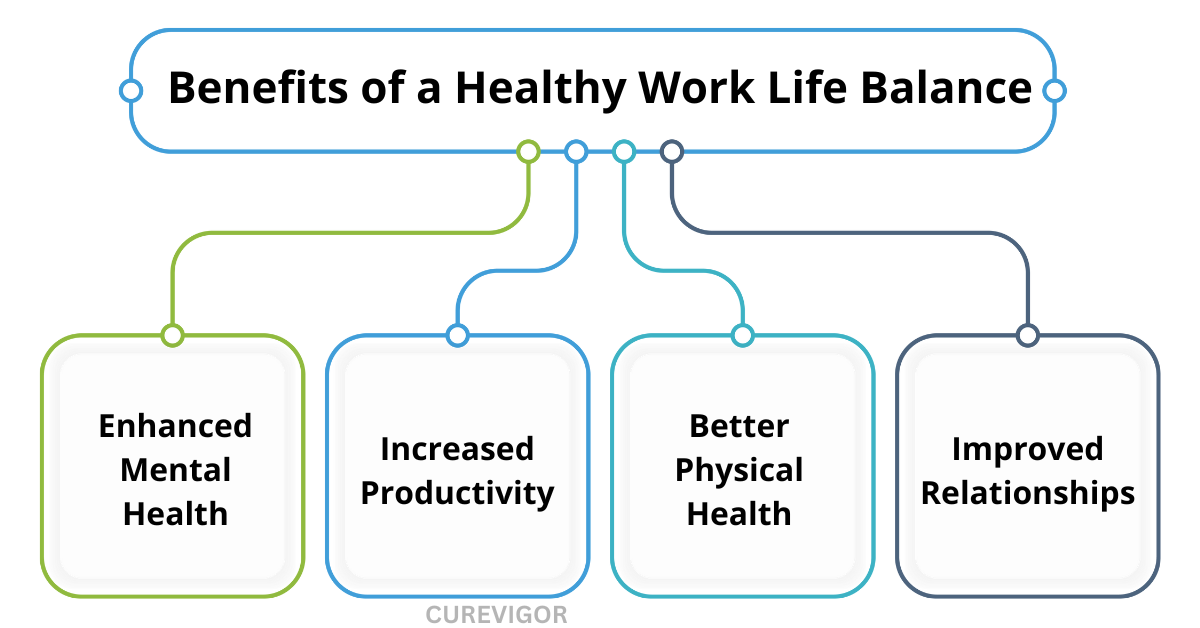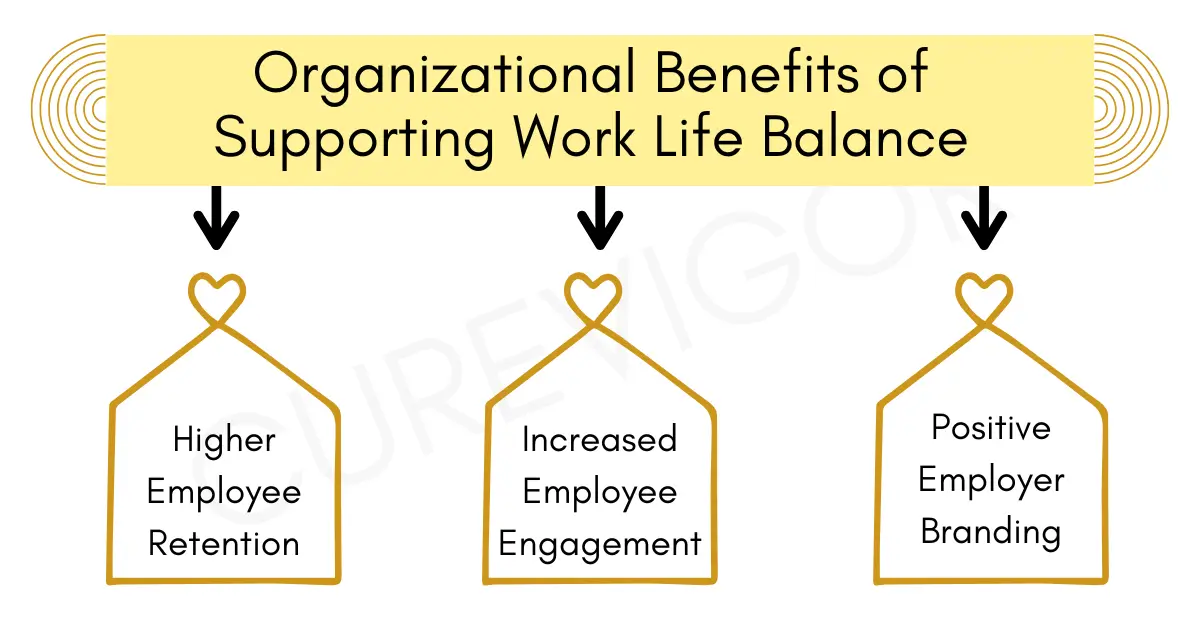Maintaining a healthy work life balance is crucial in today’s busy world. Find its importance, benefits, and how businesses can promote personal and professional fulfilment.
Thank you for reading this post, don't forget to subscribe!The Concept of Work Life Balance
A work life balance is ideal in which a person devotes time and energy to personal and professional obligations. It allows the person to pursue a rewarding profession while caring for their personal connections, health, and interests. Neither work nor personal life takes precedence in this equilibrium.
Achieving this balance means setting clear boundaries between work hours and personal time, managing workloads effectively, and ensuring that personal time is spent on activities that bring relaxation, joy, and a sense of fulfillment.
How Important is Work Life Balance
The pressure to perform professionally lowers the boundaries between work and home life in today’s workforce. The proliferation of technology has facilitated employees’ ability to remain engaged beyond regular office hours, perhaps resulting in excessive work and disregard for personal time.
Constant connectedness can lead to increased stress, fatigue, and a lower standard of living. Employees can safeguard their mental and physical health by maintaining a healthy work-life balance, increasing their job satisfaction and well-being.
The Impact of Effective Time Management
Effective time management is essential to establishing a work life balance. Employees with good time management skills may be productive throughout working hours and fulfill their professional responsibilities without having to work past their breaks.
In addition to assisting with task prioritization and preventing procrastination, time management also lessens the chance of overloading oneself with work. People can take full advantage of their free time without worrying about incomplete tasks.
Reduce Stress and Improve Professional Happiness
Employee stress levels are lower when they can effectively separate their personal and professional lives. Anxiety, depression, high blood pressure, and even heart disease are just a few of the serious negative consequences that stress, significantly prolonged stress, may have on social and mental health.
People who adopt a balanced approach to work and life can rejuvenate during their time, guaranteeing that they return to work with a renewed sense of purpose and vitality. As a result, employees feel less stressed by work obligations and more in control of their lives, raising job satisfaction.
Enhanced General Health
Better physical health is also associated with achieving work life balance. When work precedes their personal lives, people frequently forgo sleep, exercise, and healthy eating habits—essential for preserving good health. People who lead balanced lives emphasize their health by finding time for regular exercise, healthy eating, and enough sleep.
It can improve long-term health outcomes by lowering the risk of chronic illnesses, including obesity, diabetes, and heart disease, especially when paired with lower stress levels.
A Necessity for Long-Term Success and Happiness
Work life balance is ultimately necessary for long-term success and satisfaction. Prolonged stress can lead to burnout, a state of emotional, physical, and mental weariness that can seriously impair a person’s personal and professional lives.
Burnout is more likely to occur in those who continuously put their work before their individual needs. Burnout can result in decreased productivity, frequent absences, and a poor outlook on life and work.
When people prioritize balancing work and personal time, they can better sustain their effectiveness at work and have a satisfying personal life. This leads to long-term success and pleasure. Work life balance is essential for preserving physical and mental health, guaranteeing long-term career success, and fostering personal happiness.
Tips to Improve Work Life Balance

Both professional success and personal well-being depend on striking a healthy work life balance. Even though balancing the demands of work and personal life might be difficult, there are doable actions people can take to have better-balanced lives. Here are some practical suggestions for enhancing work-life balance:
1. Set Clear Boundaries Between Work and Personal Life
Setting boundaries between your job and personal time is one of the best strategies for balancing things. Set clear start and end times for your workday and give yourself the highest priority in adhering to these schedules.
It’s best to avoid bringing it home with you or viewing work emails when you’re not working because it makes it harder to distinguish between work and personal life. Establishing limits guarantees you time for individual pursuits and helps avoid burnout.
2. Set Task Priorities and Assign work
Prioritizing your responsibilities may improve your time management skills. List your weekly or daily chores and rank them according to significance. Focus on high-priority tasks first, and don’t hesitate to delegate tasks others can handle. It enables you to effectively manage your workload and free up more time for personal activities without compromising productivity at work.
3. Schedule Personal Time for Responsibilities at Work
Setting aside time for personal hobbies is just as crucial as scheduling business meetings and deadlines. Schedule blocks of time for things that help you unwind and rejuvenate, whether exercising, spending time with family, or engaging in a hobby. To maintain a balanced routine, give these personal responsibilities the same weight as your work-related commitments.
4. Learn to Say No
When you take on new jobs or projects constantly, at work and in your personal life, it’s easy to become overwhelmed. Saying no is a crucial life skill for preserving work life balance. Before committing to additional tasks, consider whether you have the time and energy to handle them without sacrificing your well-being. Saying no to non-essential work or social engagements can free up time for activities more aligned with your priorities.
5. Take Regular Breaks During the Day
Short breaks will improve your concentration, output, and general well-being throughout the workplace. These pauses, which might take a five-minute break, an outside walk, or a break from your desk for lunch, allow your body and mind to rejuvenate. Frequent pauses from work can help minimize exhaustion and increase productivity, which frees up more energy for personal hobbies.
6. Utilize Flexible Work Options
Make the most of any flexible work options your business has, such as reduced workweeks, flexible hours, or remote work. With these alternatives, you can adjust your work schedule to suit your demands better and manage your professional and personal obligations more efficiently. Long commutes are less stressful when you have flexible work arrangements, which frees up more time to concentrate on your professional and personal well-being.
7. Practice Time Management
It takes proper scheduling to keep a work-life balance. Use time-blocking strategies, planners, and to-do lists to control your professional and personal obligations. By practicing effective time management, you can prevent last-minute rushes, lessen stress, and ensure you have enough time for yourself and your loved ones.
8. Set Realistic Goals and Expectations
Setting reasonable objectives for your personal and professional lives helps you avoid burnout and over-commitment. Don’t set unattainable deadlines for yourself; divide more complex projects into smaller, achievable chunks. You may manage your workload without compromising your time or adding to your stress by creating attainable goals.
9. Seek Support When Needed
Never be afraid to ask for help from others if you’re feeling overwhelmed or having trouble maintaining your equilibrium. Speak with your management about modifying your work schedule or burden, or ask friends and family for help with personal obligations. Asking for assistance when necessary is a proactive measure to preserve equilibrium rather than a display of weakness.
10. Take Time for Self-Care
Sustaining a positive work life balance requires self-care. Allocate time for pursuits that aid in relaxation and stress relief, such as reading, working out, practicing meditation, or going outside. Making self-care a priority enhances your physical and mental health, making it more straightforward to successfully balance your personal and professional obligations.
Implementing these suggestions into your daily schedule can help you attain a better work life balance. You may lead a more contented and prosperous life by prioritizing your well-being, creating boundaries, and using your time effectively.
Benefits of a Healthy Work Life Balance

1. Enhanced Mental Health
Living a balanced life results in better mental health. Workers who can turn off their work during their time are less likely to get depressed, anxious, or burned out. Recent research indicates that overworked workers are more likely to experience mental tiredness, which can impair their work performance and relationships outside of it.
2. Increased Productivity
Research reveals that employees who maintain a work-life balance are more productive over the long term, in contrast to the widespread perception that working long hours leads to increased production. With renewed energy and motivation, they approach their jobs, intending to complete them quickly, resulting in increased productivity and job happiness.
3. Better Physical Health
Work life balance also influences physical health. Chronic stress from long working hours is linked to various health issues, such as cardiovascular diseases, hypertension, and diabetes. Encouraging employees to balance their work with rest and leisure activities can lead to healthier lifestyles, reducing absenteeism and health-related costs for companies.
4. Improved Relationships
Workers who can make time for their friends, family, and interests are more likely to cultivate positive relationships. This sense of personal fulfillment results in a more optimistic attitude at work and home. Strong support networks outside the workplace can help employees deal with stress and obstacles at work.
How Employers Can Promote Work Life Balance
1. Flexible Working Hours
Providing flexibility in working hours is one of the most effective ways employers can help employees maintain a work-life balance. Flexible schedules allow employees to manage personal commitments while maintaining their professional responsibilities. This autonomy fosters trust and shows employees that their well-being is valued.
2. Remote Work Options
In recent years, remote work has gained significant traction, allowing employees to manage their time more efficiently. By allowing employees to work from home, companies can reduce commute stress, enabling them to spend more time with their families or engage in activities promoting relaxation and well-being.
3. Encouraging Breaks and Downtime
Employers should encourage employees to take regular breaks and downtime during the workday. Encouraging vacation time and creating a culture where taking time off is accepted and encouraged helps prevent burnout. Employees who return from vacations or short breaks are more likely to be productive, creative, and engaged.
4. Wellness Programs
Wellness programs focusing on physical and mental health can promote a better work life balance. Companies can implement on-site fitness facilities, mental health resources, counseling services, or wellness challenges. These initiatives signal to employees that their health is a priority, encouraging them to balance work and personal life.
Balancing Technology: Managing Digital Overload
While technological advancements can benefit work efficiency, they also blur the boundaries between work and personal life. Employees often struggle to “switch off” due to constant emails, messages, and “notifications”.
Employers can minimize digital overload by setting boundaries on after-hours communications and fostering a culture where employees are not expected to be available 24/7.
1. Setting Boundaries for Digital Communication
Explicit after-hours emails or work-related communication guidelines can help employees mentally detach from work. Employers can encourage employees to log off after a specific time and refrain from sending non-urgent messages outside work hours.
2. Encouraging the Use of “Do Not Disturb” Modes
Staff members should be encouraged to adopt “Do Not Disturb” device settings during personal time. This simple yet powerful tactic promotes a better balance by removing the distraction of work alerts and allowing people to concentrate on their personal lives.
Organizational Benefits of Supporting Work Life Balance

Employers supporting work-life balance enhance employee well-being and strengthen the organization. Companies that prioritize this balance benefit in several ways:
1. Higher Employee Retention
Work life balance is one of the most critical factors employees consider when deciding whether to stay with a company. Companies that offer flexible working conditions promote mental and physical well-being, and encourage personal growth are more likely to retain top talent.
2. Increased Employee Engagement
Employees who feel their personal needs are respected and supported are more likely to be engaged and committed to their work. Engaged employees are productive and motivated and often take pride in their work, contributing positively to the company’s culture and success.
3. Positive Employer Branding
Companies known for fostering work-life balance have a competitive edge in attracting talent. A reputation for caring about employees’ personal and professional well-being can position the company as an employer of choice, appealing to high-caliber professionals who value a healthy lifestyle.
Final Thoughts
It is impossible to exaggerate the significance of work-life balance. A harmonious balance between professional and personal life is essential for employee well-being and an organization’s long-term success.
According to a study by the American Psychological Association, 67% of workers reported feeling more stressed due to an imbalance between work and personal time. Additionally, a 2023 survey by LinkedIn revealed that 76% of professionals consider work-life balance a crucial factor when evaluating new job opportunities.
Businesses prioritizing work life balance gain benefits, such as higher worker productivity, decreased employee attrition, and better mental and physical health.
A Gallup study found that companies that aggressively support work-life balance see a 21% boost in profitability. Further evidence that when workers feel supported, they are more likely to remain devoted and motivated comes from the 50% lower employee turnover rates of firms with robust work life balance policies.
To sum up, encouraging a good work life balance is beneficial and a very effective tactic for increasing employee happiness and business success. Businesses can implement measures to establish flexible, balanced work environments to improve productivity, lower burnout, and develop happier, more engaged staff.
FAQs
Q. What is having a work life balance?
Having a work-life balance means equally prioritizing the demands of your job and personal life. It involves creating a boundary between professional responsibilities and personal time to ensure neither dominates.
It helps reduce stress, prevent burnout, and improve overall well-being. When work-life balance is achieved, individuals can enjoy personal activities, relationships, and health without compromising their career goals.
Q. How do you maintain a work life balance?
Maintaining work-life balance requires setting clear boundaries between work and personal life. This can be done by sticking to a defined work schedule, delegating tasks, and learning to say no when necessary.
It’s also important to prioritize personal time, practice good time management, and take daily breaks. Focusing on self-care and hobbies outside of work ensures you recharge mentally and physically.
Q. What is an example of an excellent work life balance?
An example of a good work-life balance is an individual who works productively during set hours and entirely disconnects from work once the day ends. They dedicate evenings to personal activities such as spending time with family, exercising, or pursuing hobbies.
Weekends are reserved for relaxation or leisure, allowing them to recharge. This separation will enable them to manage professional duties without sacrificing personal happiness and well-being.
Q. What is quality work-life balance?
Quality work-life balance means effectively managing time and energy so that neither work nor personal life suffers. It involves balancing hours and maintaining high productivity at work and fulfilment in personal life.
A quality balance ensures reduced stress, enhanced job satisfaction, and time for personal growth. It promotes mental and physical well-being, ensuring both areas of life are enriching and rewarding.
Q. What is the main objective of work-life balance?
The main objective of work-life balance is to prevent burnout by ensuring individuals have adequate time to meet professional and personal demands. It aims to create harmony between work and life, resulting in improved mental health, greater job satisfaction, and a happier personal life. Individuals can sustain long-term success by achieving balance without compromising their physical and emotional well-being.
Q. How do you create balance in life?
To create balance in life, start by identifying your priorities and setting clear goals for both work and personal life. Manage your time effectively by scheduling dedicated time for work, family, self-care, and hobbies. Learn to set boundaries and say no to non-essential commitments. Mindfulness, regular exercise, and seeking support from others can also help maintain balance. Reassessing and adjusting these strategies will ensure a fulfilling and balanced life.
Read more articles on Health and Wellness Tips.
You might like to read:

